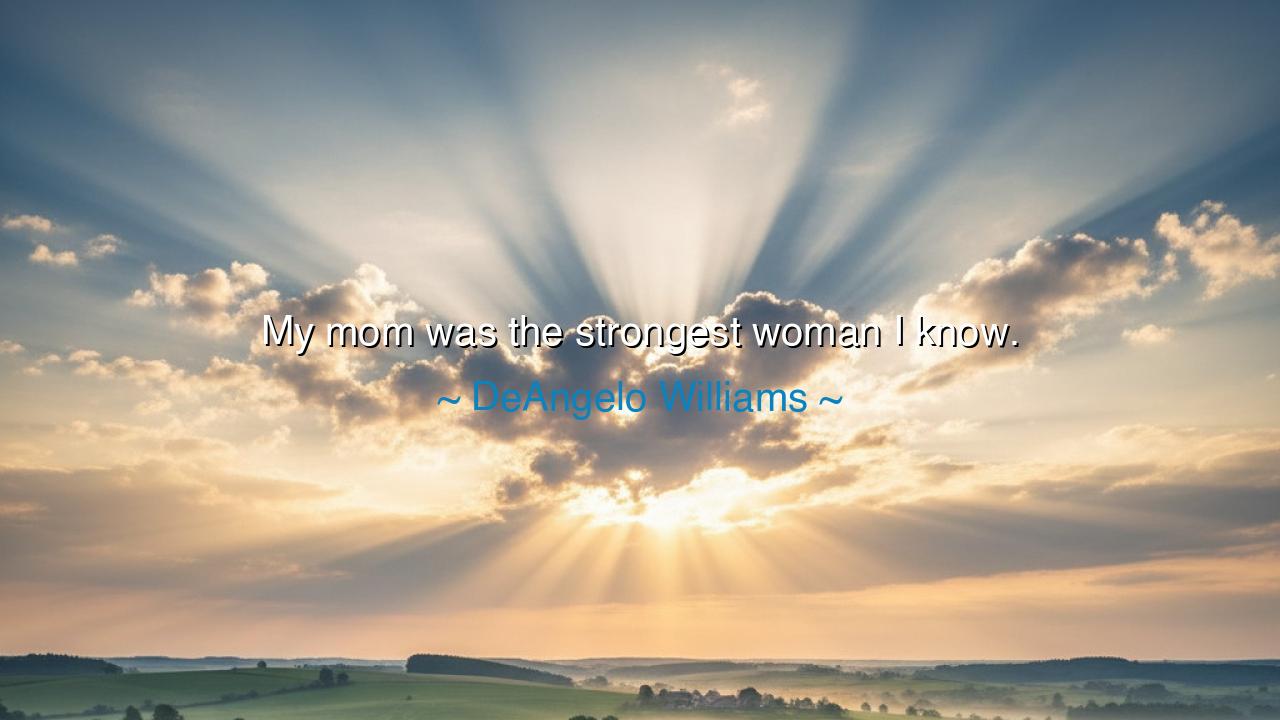
My mom was the strongest woman I know.






When DeAngelo Williams said, “My mom was the strongest woman I know,” his words rang with both sorrow and reverence — the kind of reverence born only from love that has witnessed both life and loss. This was no casual compliment; it was the testimony of a son who had seen his mother face the deepest suffering and yet stand unbroken. His mother, Sandra Hill, fought a long and courageous battle against breast cancer, a battle that ended not in defeat, but in eternal dignity. In speaking these words, Williams was not merely honoring her memory — he was speaking of the essence of true strength, the kind that does not shout, but endures.
In the language of the ancients, such strength was called fortitude of the soul — a power greater than the sword or the shield. It is the ability to rise, again and again, when the weight of life would crush the spirit. When DeAngelo watched his mother fight through pain, he saw what philosophers and heroes alike have praised since the dawn of time: that real power is not domination over others, but mastery over one’s own suffering. His mother’s struggle, fought with courage and grace, became a living scripture, written not in ink but in example. Through her, he learned that the heart’s resilience is the greatest inheritance a parent can leave behind.
Her story, though deeply personal, echoes through the stories of countless women across time who bore pain in silence and turned hardship into legacy. Think of Harriet Tubman, who carried her people through the dark fields of bondage into freedom, guided by faith and the North Star. Or Queen Esther, who risked her life to save her people, armed only with courage and wisdom. Such women, like DeAngelo’s mother, draw strength not from privilege but from purpose — from love so fierce it refuses to yield, even to death. Their power does not glitter like gold; it gleams like iron, forged in fire.
The origin of this quote lies not in grandeur, but in grief. Williams spoke these words after his mother’s passing, as he dedicated his efforts to raising awareness and funding for breast cancer research. In his activism, he transformed personal loss into public light, ensuring that his mother’s spirit would not fade into silence but live on in hope for others. This is the eternal pattern of love: that what the strong endure becomes the strength of the generations that follow. When he says she was the strongest woman he knew, he is not only remembering her — he is continuing her fight, carrying her courage forward as his own.
There is something profoundly sacred in such remembrance. The ancients would say that when a son honors his mother, he honors the divine feminine — the life-giving force that sustains the world. For every civilization has understood this truth: that the strength of women is the spine of humanity. It is the mother who endures labor to bring forth life, who carries burdens unseen, who teaches through patience, who suffers yet continues to give. In DeAngelo’s mother, we see that same eternal archetype — the woman who bore her suffering with quiet valor, transforming agony into legacy.
From her example, a great lesson arises: strength is not the absence of pain, but the refusal to be defined by it. The strong do not escape hardship — they transcend it. The strong woman does not seek pity, for her heart has learned to turn despair into compassion and adversity into purpose. We, too, are called to cultivate this strength — to face life’s trials not with bitterness, but with endurance and love. And when the storm comes, as it comes to all, we must remember that the greatest tribute we can give to those who came before us is to carry their courage within our own actions.
So, my listener, take this wisdom to heart: honor the strong who raised you. Speak their names, remember their sacrifices, and live in a way that keeps their strength alive through you. If you have known a mother, a sister, or a friend who carried you when you could not stand, do not let their lessons fade into memory. Make them deeds. For in doing so, you continue their story — and their spirit becomes eternal.
As DeAngelo Williams said of his mother, so too may we say of all who have guided us through darkness: they were the strongest we have ever known. And through their strength, we find our own.






AAdministratorAdministrator
Welcome, honored guests. Please leave a comment, we will respond soon